How Social Media Plays a Role in Reputation Management

Answering shortly, social media plays a crucial role in reputation management. Yet, answering profoundly will take an entire article. In this case, we’ll adhere to the second option.
We have already covered many aspects of social reputation analysis, including social media. In this piece, we’ll take an in-depth look at the role social media platforms specifically play in reputation management.
What is reputation management?
If you’re craving an academic answer, then reputation management is the strategic process involving creating, monitoring, and replying to user feedback. It involves analyzing various social media platforms, review sites and forums to enhance and maintain your brand’s image.
In other, simpler words, reputation management is a set of review management operations created to improve and shape the perception of your business or brand. Aspects like monitoring tools, scheduled response activities, and proactive strategies lie at the heart of this process. Ultimately, they work on one goal: to improve the perception of your platform and increase the trust level between your brand and customers—both current and potential.
The expected result of this process is obvious: businesses with a high-quality reputation management strategy always have a much higher chance of ranking higher in local search results.
How does social media affect reputation management?
It’s no secret that social media platforms like Facebook, X, Instagram, Reddit, and others provide a powerful, real-time medium for communication, feedback, and engagement, making reputation management both more challenging and more essential. With so many platforms and aspects they affect, social media always have a strong impact on a business’s reputation. Let’s list some examples of such effects and the two effects it may lead to.
Real-time feedback and public interaction
In fact, immediacy of feedback is one of the most significant impacts of social media on reputation management. Social media provide a safe space for people to share their experiences instantaneously with a global audience. Thus, this real-time feedback loop creates both opportunities and challenges:
Opportunity for engagement. The lightning-fast feedback inherent to social media allows you to communicate with people right away, i.e., respond to comments, address concerns, and answer frequently asked questions. People love fast answers in any service, so with this immediate interaction, you can build solid credibility and trust.
Challenge of speed. Negative mentions or harmful reviews can spread like wildfire, causing damage before you even have the chance to respond. Effective reputation management requires constant vigilance and a swift response strategy to mitigate any adverse effects.
Amplification of brand messaging
Essentially, messaging is one of those things that makes people talk about your brand. Social media, in turn, can greatly amplify it, providing you with a space for sharing the company’s philosophy, ideas, new developments, and more. Yet this amplification can provide you with two exposure types:
Positive exposure. When you share valuable content, positive stories, and achievements, they can enhance their reputation and reach new potential customers. Viral posts and thoughtfully made videos can significantly boost a brand’s image.
Negative exposure. Conversely, any missteps or negative incidents can be equally amplified. A single negative post, poorly explained joke, or concept can go viral, damaging your reputation with the speed of light. Managing this risk requires careful planning and consistent positive engagement.
Crisis management
Unfortunately, crises happen, and no one is insured from them. Yet, social media can greatly turn the tables in such cases. When a crisis occurs, your online appeal becomes very vulnerable, and how your business responds on social media feels like it is being observed under the microscope. Thus, make the most of it (in a positive way)!
Rapid response. Social media allows you to quickly address the situation, provide updates, and communicate with stakeholders. A thoughtful and clear response can help mitigate damage and retain trust.
Ongoing communication. During a crisis, continuous communication is essential. Keeping the public informed and showing accountability can be helpful in managing various issues effectively.
Why do you need a social media reputation management strategy?
Simply put, there’s no other choice. You and your business, with all its products or services, cannot avoid the monumental importance of reputation management when using social media. Let’s list a few reasons to support this statement.
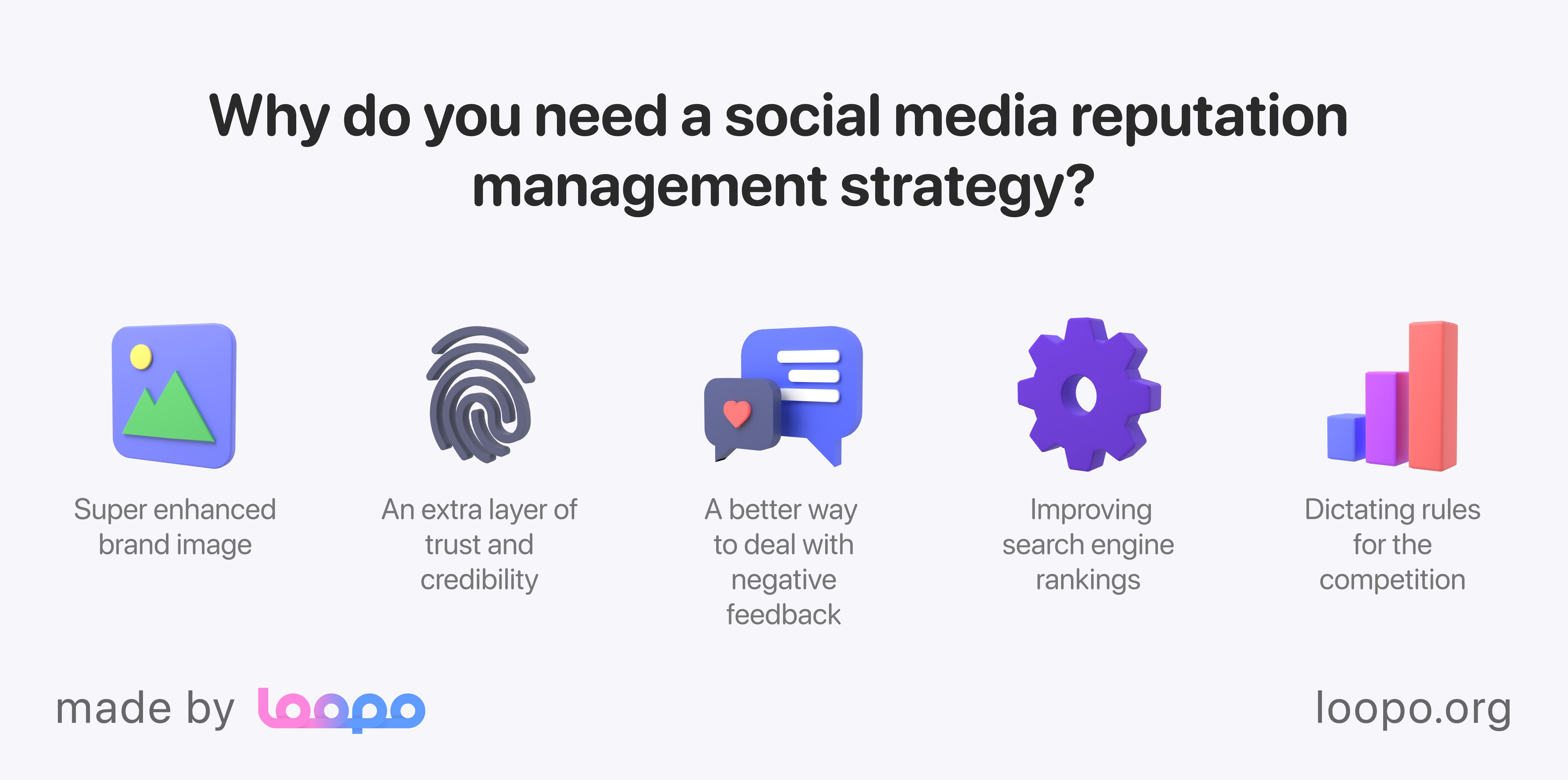
Super enhanced brand image
Having a firm social media reputation management strategy, you can boost your brand image to the skies. The only task is to maintain it properly.
Therefore, if you actively manage your social media presence, you even get to control the narrative surrounding your brand. The only thing left to do is to keep your online presence alive.
An extra layer of trust and credibility
With a proper strategy, you can build up a solid level of credibility online. The only thing left to do is to stay transparent, responsive, and authentic in your social media interactions. These qualities show your reliability and integrity the best.
A better way to tackle negative feedback
Negative feedback is inevitable, but the way you handle it can matter as it can change the game entirely. Yet, a thorough strategy can help a lot as it often includes guides on how to address negative comments and reviews.
The simplest thing you can do is acknowledge issues, apologize on behalf of the company when necessary, and offer solutions. Yet, doing it in a professional and consistent manner is a whole new level. To reach it, a reputation strategy is a must. Simply put, with it, you can turn a negative situation into an opportunity to showcase your commitment to customer satisfaction.
Improving search engine rankings
As simple as it sounds, activity on social media can impact your search engine rankings. All search systems we use work with activity metrics like shares, likes, and comments. The more active these metrics are, the more authority and relevance your content has for users. A robust reputation management strategy that encourages positive social interactions can boost your search engine optimization (SEO) efforts. In turn, higher rankings often lead to increased organic traffic and greater brand visibility.
Dictating rules for the competition
In terms of competitiveness with other companies, a strong social media presence is an ace. With a properly set up reputation management strategy, you can be ahead of competitors by consistently monitoring and improving your online reputation.
Learning to go the extra mile in everything you do online would be a great differentiating factor. In layman’s terms, understanding how your competitors are perceived and identifying opportunities to differentiate yourself can position you more effectively.
How to do social media reputation management successfully
In short, there are dozens of ways for social reputation management, and these vary depending on your niche, ideas, and practices adopted in the company. Yet, to avoid confusion, let’s stick to the most established steps.
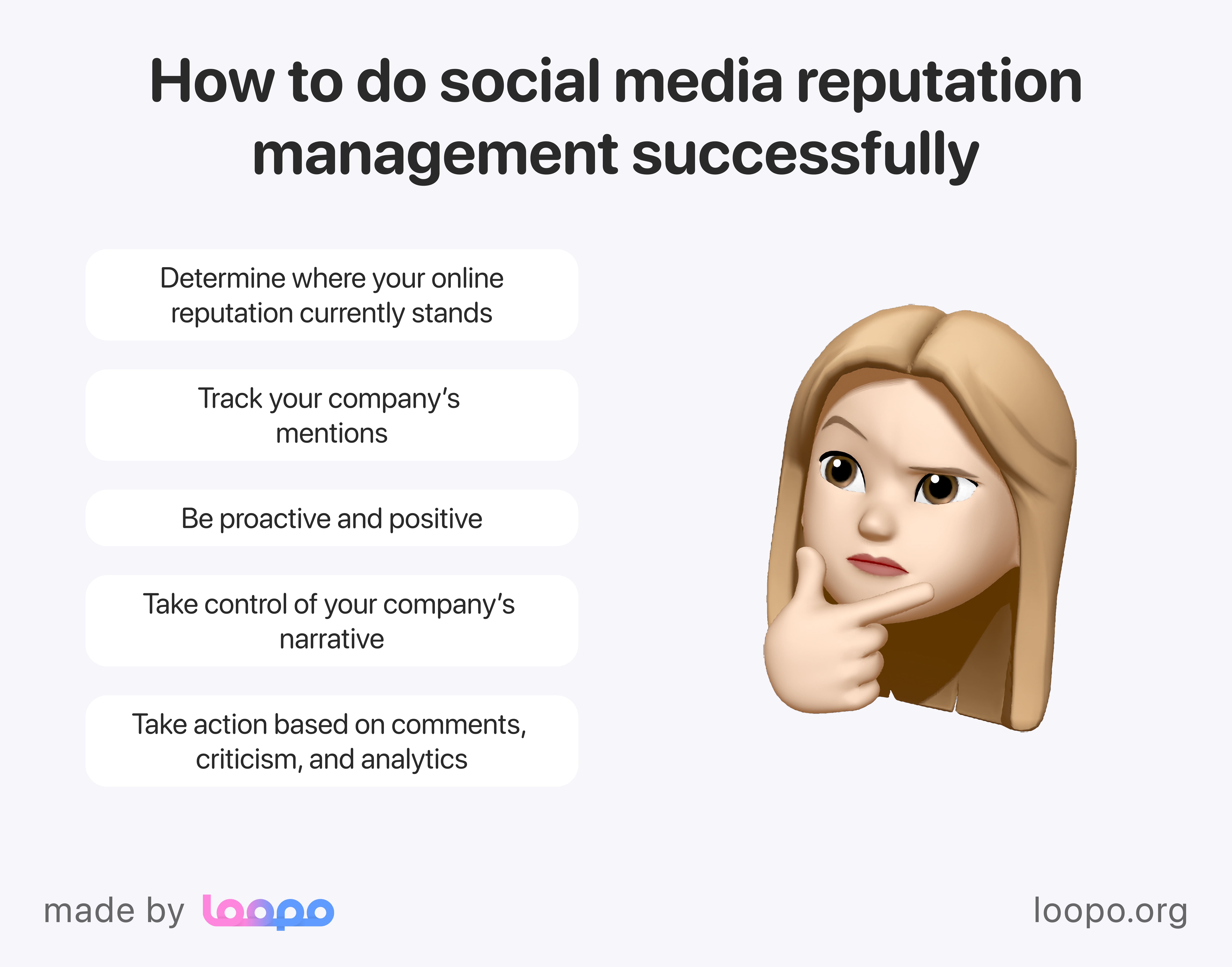
Determine where your online reputation currently stands
The first step in successful social media reputation management is to understand your current status, i.e. where you stand on the market and what’s the situation with the perception of your brand.
Getting a clear view of everything, you can evaluate the situation properly before taking any actions. Therefore, thoroughly analyze your brand’s presence across various social media platforms. Analyze the tone and sentiment of user interactions and comments. Identify key strengths and areas needing improvement to form a baseline for your strategy.
All the data gathered will be of great help in taking decision-based actions and seeking improvements.
Track your company’s mentions
In social media analysis, monitoring mentions of your company is as important as any other aspect. For this task, utilize social media listening tools which we will cover later on. These can be super helpful in tracking every mention of your brand, whether direct or indirect. Why need it though?
Tracking mentions of your brand across the web can help you stay informed about public perception, detect emerging trends, and respond promptly to any potential issues or opportunities.
Be proactive and positive
Proactivity always pays off. This mindset can significantly enhance your reputation, demonstrating that your brand is willing to cooperate, talk, and develop relationships with its audience.
Moreover, it can be done easily! Simply put, regularly connect with your audience in many ways: share valuable content, respond to comments, ask for their feedback and spark discussions. In this matter, all you need to do is maintain a positive tone, develop a consistent messaging, and showcase your brand’s values.
Take control of your company’s narrative
The way you decide to communicate your brand’s values and connect with your users forms the narrative, which should be totally under your control. Therefore, there are many things you can do to keep it under control.
First off, develop a consistent messaging, style, and tone of voice. It should be clearly seen in any social media channel you use. Then, control the narrative by creating and sharing compelling stories that highlight your brand’s mission, achievements, and values. After all, consistent and authentic communication helps shape public perception in your favor.
Act based on criticism, comments, and analytics
Proactivity is always welcome, yet your strategy and its subsequent implementation should revolve around facts instead of assumptions. Hence, use feedback and analytics to inform your strategy.
On social media, pay attention to comments and criticisms, regardless of their mood. Analyze all the data available to you to outline trends in mentions and comments. Only after that, take actionable steps to resolve various issues.
Top social media reputation management tools
The more social media get incorporated in our lives, the more challenging they become to track and keep under control. Luckily, there are dozens of handy tools on the market that can help you perform all monitoring, analysis, and improvement tasks.
Social Inbox by Semrush
This social media management tool by Semrush is a dedicated app built with all the tools you need to control your social media in one place. From within the app, you can see all incoming comments, mentions and direct messages from Instagram, LinkedIn and Facebook.
To use it, all you need is to connect all your accounts to the app and purchase a subscription which costs $29.99 per month.
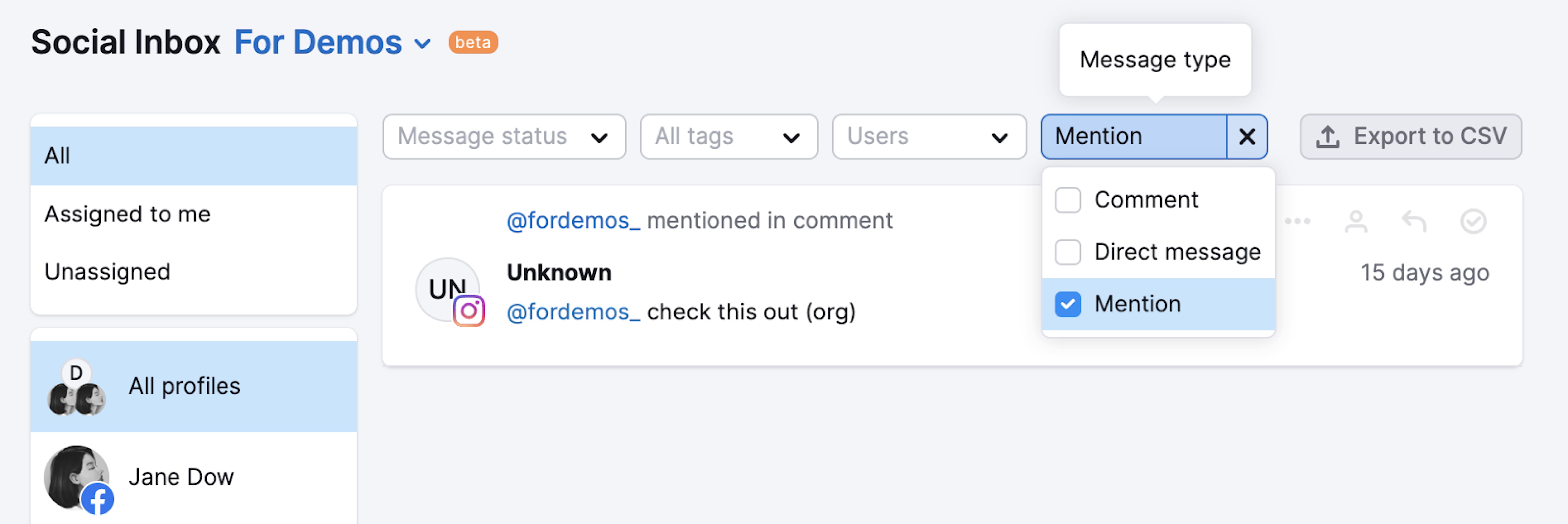
Media Monitoring
Another superb social media and reputation management tool is Media Monitoring, an app that was built to integrate into Semrush CRM. It has all the functionality needed to:
Monitor your products or brand across the web;
Find influencers interested in your brand;
Find ideal backlink opportunities;
Analyze competition in the market;
Collect customer suggestions and sentiment across all platforms you decide to.
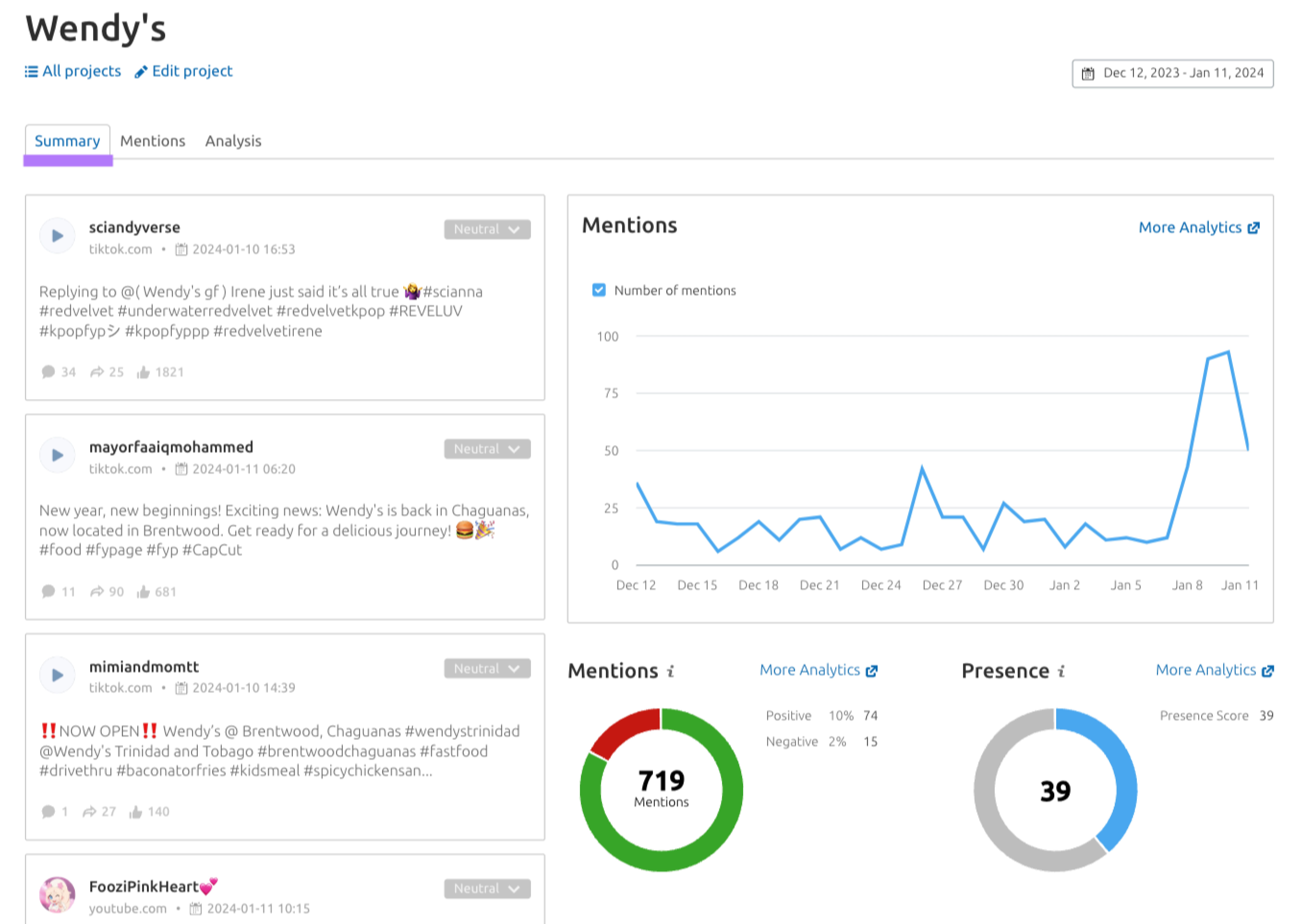
After all, this solution encompasses a lot of aspects needed for a firm social media reputation management. Besides, this app is comparatively cheap, given how much it offers. As of now, it comes with a 7-day free trial, and then the price is $39 per month.
Mentionlytics
With Mentionlytics, you can track a variety of online sources for mentions of your brand names. Apart from social media platforms, you can also analyze various forums, review sites, blogs, and other sources. Besides, it can be done super easy as all the platform asks you to do is input your brand’s name and receive the result within seconds.
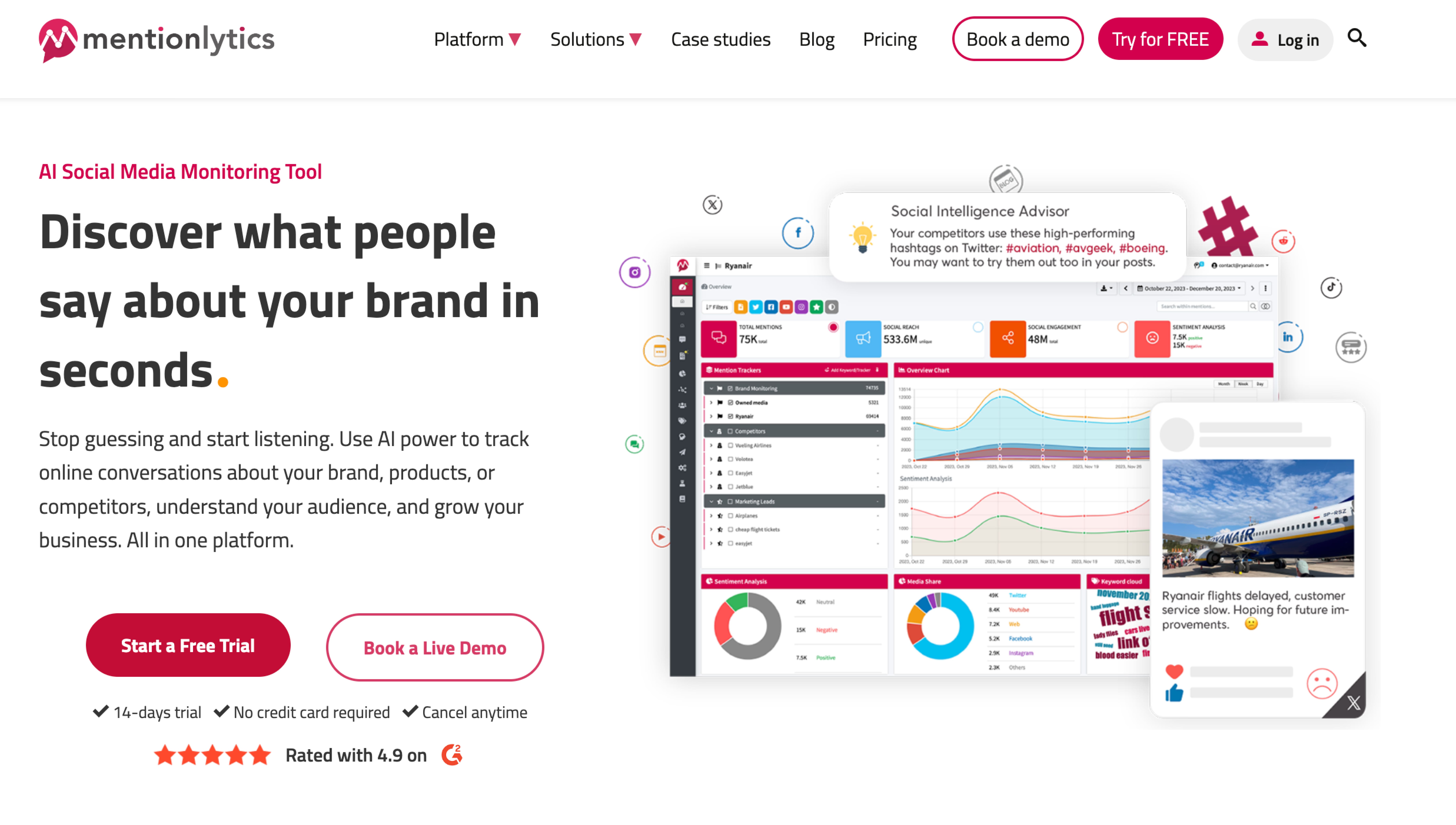
Thanks to its AI-powered approach, the tool can also differentiate positive, neutral, and negative mentions, providing a well-structured response. As of now, Mentionlytics is available under a subscription offering various plans. The basic one costs $41 per month, while other plans are much more expensive.
Brandwatch
The last one for today, Brandwatch, is a tool capable of assisting your brand in tracking and quantifying mentions across numerous channels. It provides tools for consumer intelligence, social media management, and influencer marketing.

Notably, Brandwatch is capable of monitoring over 100 million sources, thanks to the incorporation of artificial intelligence (AI) and machine learning (ML) technologies. Yet, to organize so much data, it can create custom sections and groups for mentions and comments, allowing you to prioritize certain comments.
In terms of pricing, Brandwatch offers 3 plans:
Consumer Intelligence;
Social Media Management;
Influencer Marketing.
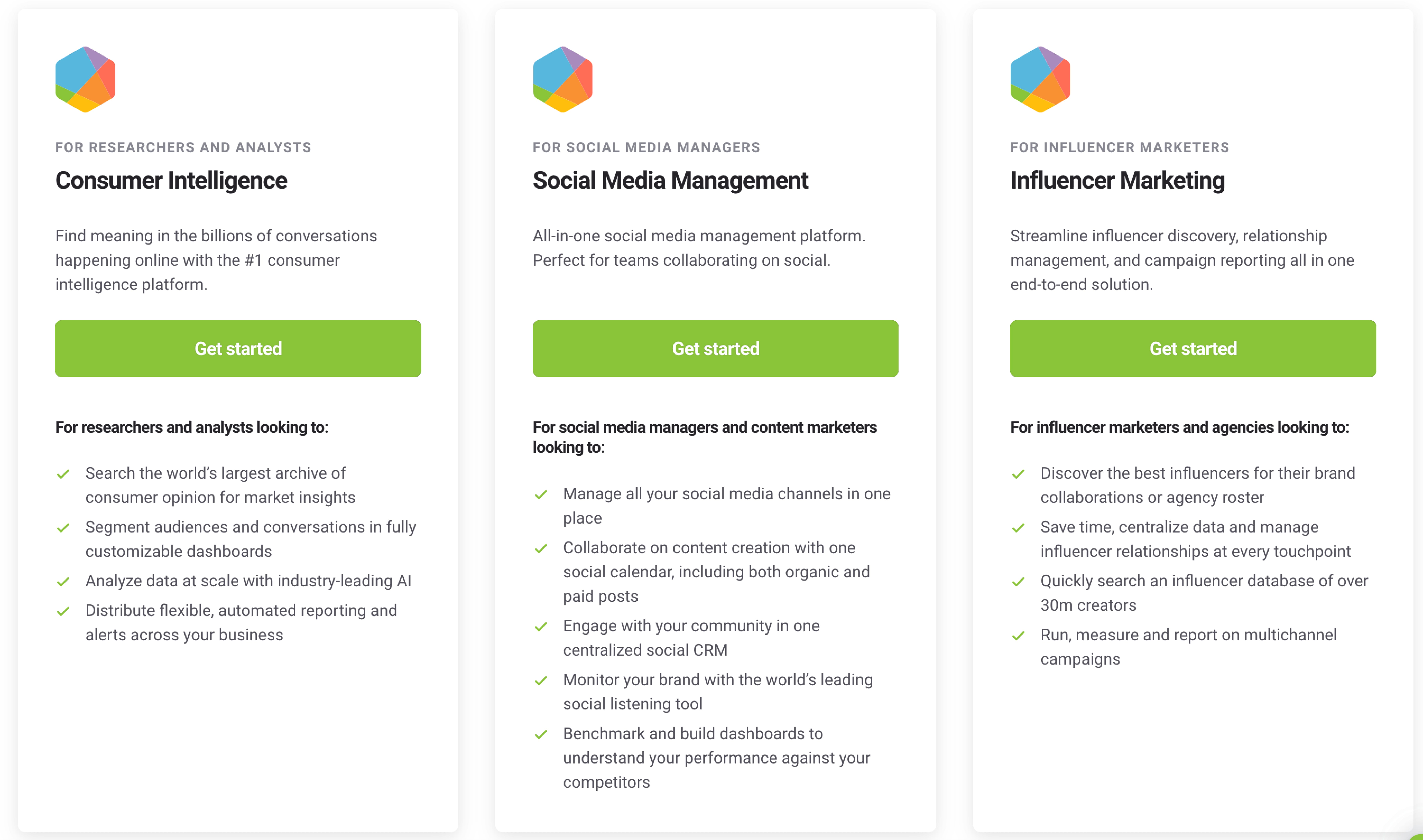
All these plans are suitable for different specialists and, thus, offer varying functionality inherent to the tasks they usually do.
Each of the tools mentioned can be of great help in reputation management on social media. They can help you analyze vast arrays of information to improve your brand’s appeal in the online realm.
Bottom line
To wrap things up, remember that social media is only one cog in a huge machine of reputational management. Yet, do not neglect it either, as the importance of social media in today’s brands’ lives cannot be overstated.
Thus, we sincerely hope you will value all aspects of reputation management. However, if you feel you lack knowledge, you can always refer to our blog, which is filled with articles on various marketing topics. Who knows, perhaps one day, this knowledge will be of great help to your company and its well-being online.
